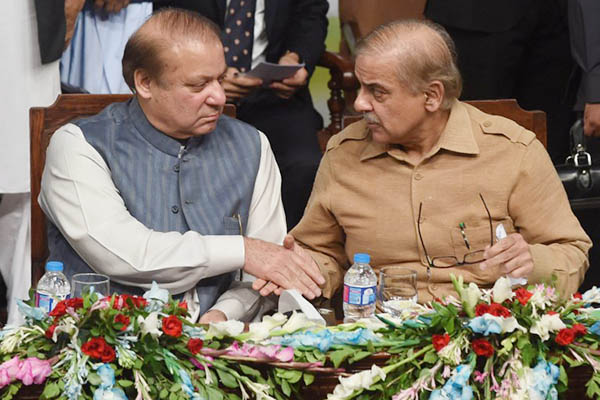
Arif Ali—AFP
Will the current chief minister of Punjab province be Pakistan’s next prime minister?
On Monday, Oct. 30, Nawaz Sharif presided over a meeting of the Pakistan Muslim League (Nawaz) comprising P.M. Shahid Khaqan Abbasi, Punjab Chief Minister Shahbaz Sharif and federal ministers Ishaq Dar, Khawaja Asif and Ahsan Iqbal. The participants decided that Shahbaz, Sharif’s younger brother, would be the party’s prime ministerial candidate after the 2018 general elections if Nawaz remains ineligible to run for the office.
Nawaz, after being ousted from prime ministership by the Supreme Court, had hurriedly named Shahbaz as party leader and prime minister, only to eat his words and name Shahid Khaqan Abbasi as the stopgap ruler till the 2018 elections. This means he took realistic advice but then was overcome by defiance, likely encouraged by his radically disposed and ambitious daughter Maryam, to block his more “flexible” brother from heading the government. But the London meeting with his party loyalists has finally convinced him to throw in the towel in what was developing into a competition for power between the brothers. Besides, a Lahore newspaper of no great circulation had published a poll in which 60 percent of Muslim League supporters had opted for Shahbaz.
Nawaz Sharif was more subject to transformation of personality through the years of political travail than his brother. He bucked the establishment—and its base of religious nonstate actors—on India, treatment of the minorities, and policies of isolationism, and kept to himself. Shahbaz was always more “realistic” and well-liked by dictators who repeatedly toppled his brother from power. Finally, the PMLN, keen to survive, has rejected his policy of defiance. Maryam will have to simmer down and get used to not being in the limelight. Late prime minister Zulfikar Ali Bhutto was defiant after being deposed by General Zia in 1977 and resultantly died on the gallows. After him, his wife Nusrat, as head of the Pakistan People’s Party, wanted to go on the warpath against the advice of senior leader Ghulam Mustafa Jatoi who became the next prime minister in 1979.
